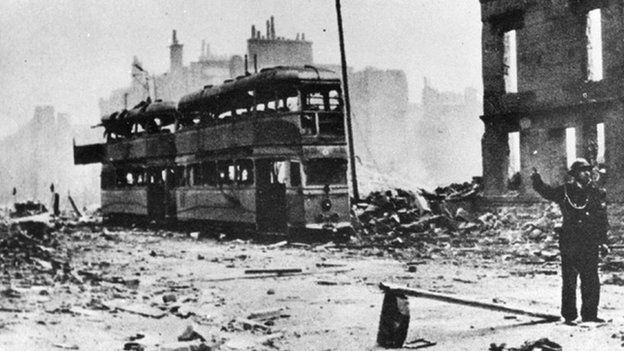Service in Glasgow for fallen WWII messenger boys
- Published

A service has been held in Glasgow to honour young messenger boys who died in air raids during Word War Two.
The city's Lord Provost Sadie Docherty lay a wreath at Dalbeth Cemetery in honour of five Glasgow Auxiliary Fire Service messenger boys.
They died at the height of the German bombing on 13 and 14 March 1941.
The boys were among 90 youngsters who cycled or ran with potentially lifesaving messages for front-line fire crews during the war.
The lord provost laid the wreath in honour of all the messenger boys who died at a Celtic Cross which was erected at the grave of 15-year-old Neil Leitch.
'Remarkable bravery'
He died from bomb injuries sustained while trying to take a communication to Partick Fire Station.
The teenager had been injured during an earlier mission when he was blown off his bicycle by a bomb.
He defied orders to rest and continued with his duties until he was fatally injured.
The lord provost said: "I am proud to join others to remember the remarkable, and little known, bravery of Neil Leitch and all the other Fire Service volunteer boy cyclists across the country, who put their lives on the line to save others during the Second World War.
"Sadly Neil Leitch along with four others paid the ultimate price that terrible night as our city and its citizens were relentlessly bombed."
Following his death, Neil Leitch was gazetted by King George VI for his bravery and devotion to duty.
His nephew James Leitch, a former Clydebank fireman who now lives in Orkney, attended the service along with family from across the UK.
'Emotional day'
James said: "I grew up hearing about my uncle Neil and this is something we have always wanted to do.
"These boys were forgotten. To me they deserve recognition. It will be an emotional day."
The lord provost was joined by George McGrandles, of the Scottish Fire and Rescue Service, the city's senior fire officer.
He formed part of a Fire and Rescue Service Guard of Honour in tribute to the youngsters.
"The role of the boy messengers isn't widely known but it was absolutely vital," he said.
"They took on an incredibly dangerous role to ensure fire crews could get to where they were needed even when bombs destroyed communications channels.
"It took incredible courage and, in trying to save others, these five youngsters ultimately lost their lives."